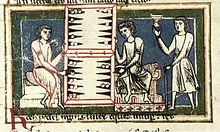Tabula
Tabula ( Latin : the board) is seen as a further development of the Roman game Duodecim Scripta and is now considered a direct predecessor of backgammon .
Around the beginning of our era, more and more variants of the already known and popular game Duodecim Scripta appeared in Rome , which had developed from the ancient Egyptian game Senet . The aim of the rule changes was to refine the somewhat rigid game and make it more exciting. One of the most popular variants was the tabula , which was played on the same board as Duodecim Scripta, the backgammon field known today.
Basically, Tabula differed from its predecessor Duodecim Scripta in that it was now also possible to hit the opponent's stones. In contrast to backgammon, it is still played with three dice .
Tabula was the favorite game of the emperor Claudius , who also wrote a book about it, but which has not survived.
Like all games of chance , tabula was officially forbidden in ancient Rome and could therefore only be played “privately”.
